So, you’ve done it. You’ve studied, effectively upskilled and achieved the creative role you’ve always wanted.
But after a while, you’ve found that ideas stop coming as easily as when you were fresh-faced, and you’re constantly interrupted by long bouts of ‘creative’s block’.
Keeping a consistent work schedule and maintaining the same standard of innovation can’t exist in tandem without, at some point, encountering a drought of ideas – this happens to everyone.
But instead of resigning yourself to putting out mediocre work for the sake of it, there are ways to re-stoke the fires of creativity again and produce spectacular results – decades into your career.
So, here are some essential tips to help you beat back creative block and put out high-quality content.
While much of this advice comes from my personal experience as a writer, these tips operate on a fulcrum of idea generation that can be applied to any creative role.
The Relationship Between Nutrition & Productivity
Our body is one big machine of cobbled-together parts that help us function – and, just like any machine, the right fuel source can make a big difference in how we perform daily.
Poor nutrition – especially for people in the creative field looking to be inspired – can result in several negative symptoms that can stop us from performing even simple tasks. These include:
- A Lack of Energy.
- Brain Fog.
- An Inability to Concentrate.
- Irritability.
If you find yourself dealing with any of these symptoms regularly, proper nutrition could solve your creativity rut.
Typically, when aiming for the right nutrition, it’s important to start with a healthy breakfast, then eat two more consistent meals a day that include these key vitamins and minerals:
- Antioxidants that significantly improve brain function.
- Healthy fats which improve your mood, and help you gain the energy and focus to produce content effectively.
- Magnesium, which improves sleep and supports stress management. Helping you deal with those high-pressure deadlines.
- Omega-3 fatty acids that increase memory, learning and cognitive ability. Helping you take on unfamiliar tasks more effectively and constantly build on your skillset.
- Vitamin B6 that further promotes brain health and helps lift our spirits.
- Vitamin C, which plays a crucial role in neurodevelopment and the formation of new neurons in the brain – improving overall cognitive resilience.
With the proper fuel, you’ll begin to see the difference – but nutrition won’t work on its own. Not without enough sleep.
The Importance of Sleep
Sleep is the foundation of creativity – even with good nutrition. If you aren’t getting the right amount of sleep, it’s tantamount to building a castle on sand.
During sleep, your body produces hormones that repair cells and regulate its use of energy. Think of nutrition like machine fuel, and sleep as your own automated mechanic.
A lack of sleep will result in the following effects:
- Brain fog and decreased cognitive function and ability to perform complex tasks.
- Lethargy, reducing our energy levels and ability to physically function.
- Depression and Anxiety, which can negatively impact our ability to manage high workloads or motivate ourselves to work.
- Decreased reasoning skills, hampering our ability to make critical and effective decisions.
- Reduced attention span, resulting in poor communication with your team, or an inability to focus on the task at hand.
To operate effectively, adults need between seven to nine solid hours of sleep. The specific amount varies from person to person, and in rare cases some people can get by within six hours – though this isn’t recommended.
Keep a log of how you feel after waking up to find the amount of sleep that’s right for your body. After all, too much sleep can also have its own negatives.
Getting the right amount of sleep can prove a challenge if our body won’t listen to us. Below is a list that’ll help you sleep when you need to:
- Avoid Blue Light: In the hour leading up to sleep, avoid sources of blue light (like phone screens) which can trick your brain into thinking it’s still daytime.
- No Caffeine Before Bed: Stop drinking caffeine four to six hours before you go to bed. Caffeine is a stimulant and will make it harder for you to get restful sleep.
- Remove All Screens: If you have the space and means to do so, move all laptops, PCs, TVs and phones out of your bedroom to separate how you see areas of the home. This will train your body to view the bedroom as a place for sleep.
- Create a Routine: Creating a bedtime routine is another way to trick your body into understanding when it’s time to sleep. As you continue with this routine, you’ll find your body naturally prepares itself for sleep.
How To Overcome Writer’s Block
With proper nutrition and sleep, the instances of creative block will decrease – but they’ll never vanish completely.
A sudden halting of new ideas is something that creatives will always contend with. That being said, there are ways to help reduce its impact on your workflow.
Below are several tips for effectively managing writer’s block:
- Look To Other Mediums: Simply finding inspiration elsewhere can solve creative block. Watch videos and read content related to the subject you’re writing about – fiction or non-fiction. This gives you a much-needed break from making content and has the potential to open your mind up to angles of thought you never knew existed.
- It’s OK to Take Breaks: The more you fight against creative block, the longer you’ll be stuck. Just go with the flow and remember that you’re at war with the subject matter and the task itself, not your own mind. Sometimes fresh air can work wonders.
- Plan Ahead: Effectively using time-blocking to plan your workflow in advance means you’ll grant yourself extra time to meet deadlines in the event of a creative block. This means any halt of progress will have a minimal impact on your work.
- Work On Something Else: Take the time to work on another task or project – preferably one that’s less mentally taxing. Working on another project satisfies the need for progress that may be frustrating us – and frustration makes creative block worse.
- Get Something Down: Whether you work in copy, SEO or even music. One of the best ways to stave off creative block is to write something down on paper. It could be a vague idea or set of incomplete thoughts – it doesn’t matter. What matters is that there is now something down on paper that you can come back to later and review with a more creative mindset.
- Tip: The best way to achieve this is by writing down a question on paper. Once you’ve done that, write a few answers and see what sticks. Go back and delete the questions and view the answers that you’re left with from a neutral perspective. It may provide the foundation for your copy.
Procrastination Isn’t a Bad Thing
‘When I start on a film I always have a number of ideas about my project. Then one of them begins to germinate, to sprout, and it is this, which I take and work with. My films come from my need to say a particular thing at a particular time. The beginning of any film for me is this need to express something. It is to make it nurture and grow that I write my script- it is directing it that makes my tree blossom and bear fruit.’ – Akira Kurosawa, Film Director
It’s a little strange to start a section of this blog with a quote from a film director, and not some copy-pro or SEO-wizard. But Kurosawa’s insight into the creative process transcends the medium of cinema – and it serves as sound advice for content creation as a whole.
Society tends to view procrastination as an inherently bad thing. Something that impedes progress and offers no benefits.
However, during periods of procrastination, creatives can often come up with their best ideas. A wandering mind explores concepts and possibilities that a task-oriented mind doesn’t have the cognitive load for.
And just as Kurosawa explains, the best ideas can only be cultivated. They don’t appear out of thin air. Producing great content has more in common with gardening than it does engineering.
There is no mathematically accurate way to come up with a good idea, and it’s up to the creative to cultivate and mould that idea into something that draws interest.
While too much procrastination can halt progress, when isolated into set time blocks, procrastination is a well of untapped creative potential that many people avoid taking full advantage of.
Here are a few tips on how to get the most out of your next period of procrastination:
- Create a set time during each day when you let your mind wander. After that set time is over, it’s back to work.
- Whenever you have a good idea, write it down. Use a notepad or the notes app on a smartphone.
- Take the time later to reflect on those ideas. Ideas that may have once seemed fleeting and insignificant may evolve into something greater after a moment of consideration.
- If you have a good idea, be prepared to stick with it. Keep noting down other good ideas when they occur – but make that one perfect idea your priority until it is finished.
Managing High Volumes of Work
Sometimes we can find ourselves overwhelmed with work, with deadlines that seem way too close to manage.
In times like these, productivity can often decrease as we panic, trying to put out perceived fires and wasting more of that valuable time on multitasking.
Work produced in this way will nearly always be inferior to work produced with enough room to think and breathe.
Tips for managing high volumes of work within a tight deadline include:
- Take a Break: It’s important to take a short break to stand back and assess the situation. Reflect on what is going wrong, and what steps can be taken to fix them.
- Time Blocking: Properly planning out tasks within set windows will go a long way in organising what little time you do have.
- Communicate: If you have a team, communicate with them. If they understand that you’re struggling to meet deadlines, you may be able to get help.
- Prioritise: Sometimes there is just too much work, and deadlines will be simply unachievable. When this happens, prioritise work in order of importance and revisit other tasks once the rush has settled.
- Limit Distractions: We need to be kind to ourselves – but there are other times that require us to be strict. If you’re severely behind on deadlines, a smartphone is only going to distract you.
- Only Certain Music Helps: While listening to music can help you focus or get the creative juices flowing, listening to songs with lyrics – especially tracks that you enjoy – can cause additional distractions. If you’re thinking about listening to music, it’s best to choose music that is instrumental only, or where vocals aren’t at the forefront of the music.
Always Review Previous Work in the Morning
We all make mistakes, so reviewing previous work is an essential tool in rooting out errors. It reduces the likelihood that your work will be sent back requiring changes or corrections (and increasing your workload in the process).
That being said, there is one important tip for double-checking work that will reinforce the quality of your content – reviewing in the morning.
When we check our work for errors after just having finished it, we’re still stuck in the ‘creative’ mindset, and not the ‘editing’ mindset. We tend to focus more on the ideas, and not on how those ideas are translated to the consumer.
This is why morning reviews are essential. It allows us to forget about our work for the evening and return to double-checking the next morning when our brain is most active.
The break from working on the content allows us to return with an outsider’s perspective that allows us to see our work from the view of an impartial observer. This is when we need to take off our gardener’s hat and put on the engineer’s hat.
Errors that weren’t apparent the previous day will suddenly reveal themselves and entire chunks of content that you thought were works of genius the day before, simply won’t work in the wider context of the piece.
Many great works find themselves under constant iterations before they see the light of day – this is the basic truth of any creative endeavour.
AI: The Colleague You Never Knew You Needed
With all the panic about how AI will interact with creative professions, it’s important to understand that AI isn’t a ‘crutch for unoriginal people’. It’s a tool, like any other, that can be used to enhance your work, not detract from it.
Sometimes our good ideas can turn into great ones by simply discussing them with peers. But what happens if there’s no one around that you feel you can discuss your ideas with? Well, AI serves as a useful surrogate.
Simply having a conversation with AI about your idea and asking it questions could lead to responses that open new angles of approach that you previously hadn’t considered.
Discussing these questions with AI is a good way of slowly iterating on your original idea until it takes the shape of something greater.
How AI Can Help Break Creative Block and Improve Productivity
Below are several general tips for creating a prompt that can inspire inspiration through AI:
- Prompt-based Writing: Simply entering the goal of what you want to write, then asking the AI to generate several writing prompts could be a useful way to inspire yourself.
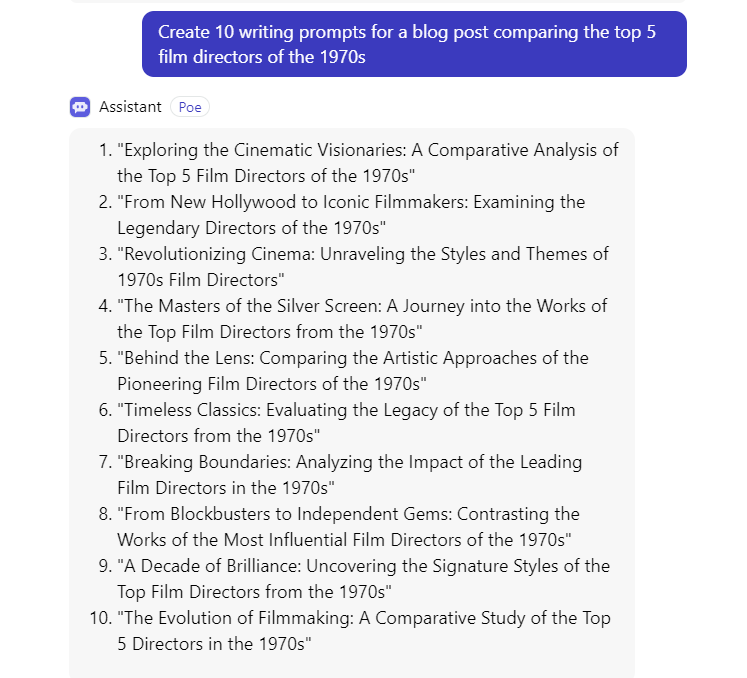
- Rearranging Ideas: If you’re stuck on a particularly gruelling paragraph, a hook for a song that doesn’t quite fit – or a particular brief that just doesn’t feel right, then rearranging those ideas with AI may be a useful tool. Simply write the idea out the best you can as an AI prompt, and ask the AI to rearrange the idea, specifying a particular tone of voice or target you want the piece to achieve.
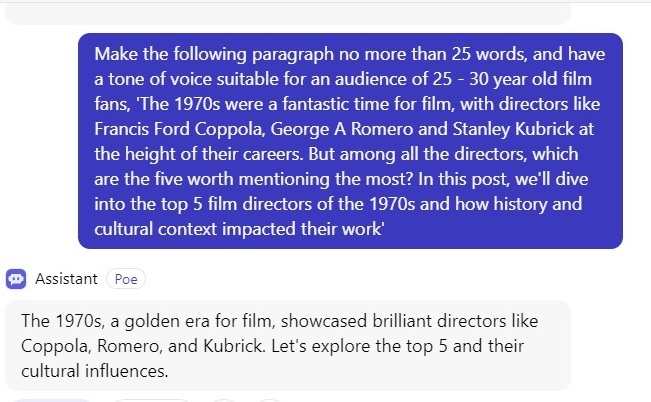
- Thought Mapping: Use AI to create a listed thought map. Enter any ideas you already have for your piece, and ask to list them in a thought map with a few idea iterations.
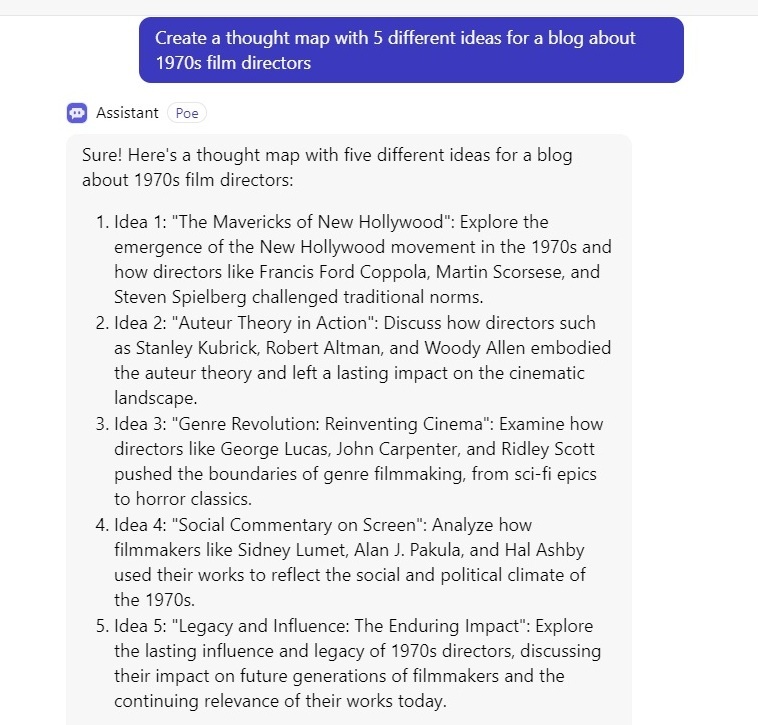
- Creating SMART Targets & Deadlines: Specifying the project and deadline specifications, and then asking AI to turn them into SMART targets are a quick and effective way to create manageable targets. Be sure to specify the exact timeframe these projects need to be completed in, however.
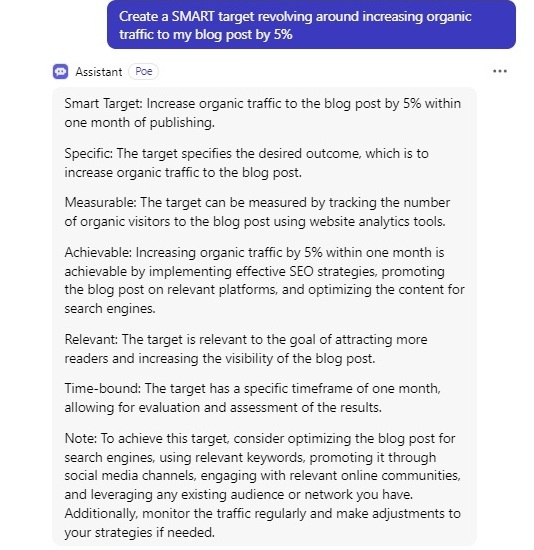
- Order Deadlines in a Chronological List: If you already have an overwhelming number of deadlines, entering them into an AI chatbot and then asking the AI to organize them in chronological order is a helpful way to take a bird’s eye view of your workload and plan accordingly.
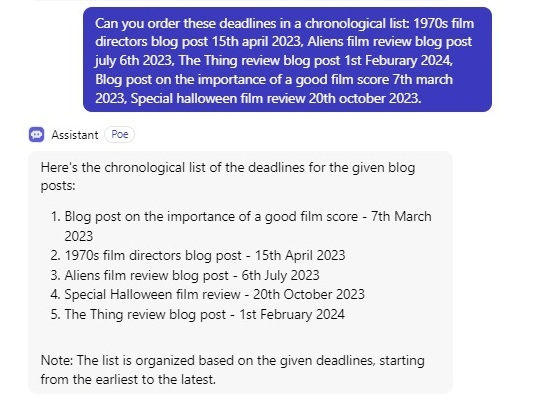
Maintaining Productivity Checklist
In summary, it’s important to not get caught up in the war for instant progress.
Instead of forcing yourself forward, it’s better to make use of the tools you have at your disposal to mitigate the impact of creative block and cultivate new ideas.
So, next time you’re in a creative rut, try these tips:
- Manage your physical wellbeing. Ensure you get the right nutrition and ample rest.
- Plan ahead and use the resources available to you – from time to colleagues and AI.
- Give yourself ample room to procrastinate and develop new ideas.
- Use time blocking to effectively account for potential disruptions.
- Make the most of your mornings to review previous work.
- Harness tools like AI to help add depth to your ideas.

Leave a Reply